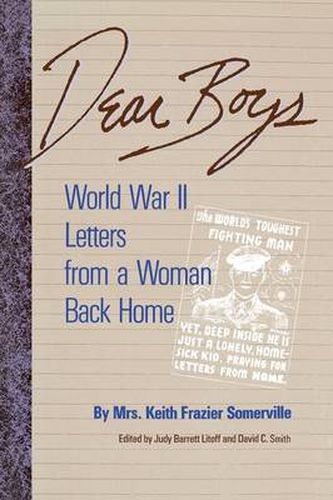Readings Newsletter
Become a Readings Member to make your shopping experience even easier.
Sign in or sign up for free!
You’re not far away from qualifying for FREE standard shipping within Australia
You’ve qualified for FREE standard shipping within Australia
The cart is loading…






This title is printed to order. This book may have been self-published. If so, we cannot guarantee the quality of the content. In the main most books will have gone through the editing process however some may not. We therefore suggest that you be aware of this before ordering this book. If in doubt check either the author or publisher’s details as we are unable to accept any returns unless they are faulty. Please contact us if you have any questions.
Throughout the war years of the 1940s there were enormous outpourings of correspondence from all parts of the United States to men and women in the service. Among these were local news columns written in the form of letters to soldiers. With a mission of sustaining morale as well as insuring that young Americans stationed far away were informed of local events, the Dear Boys column from the Mississippi Delta is a shining example of this genre. Dear Boys collects memorable columns written by Mrs. Keith Frazier Somerville (1888-1978) for the newspaper of Bolivar County, Mississippi. Filled with illuminating insights and anecdotes, these poignant letters provide a fascinating look at life in the Mississippi Delta during wartime and at what happened to local citizens scattered over the four corners of the world.
Keith Frazier Somerville, a remarkable writer, gave breadth and depth to many significant, wide-reaching topics in addition to reporting entertaining tidbits of local news. She describes the important role played by women in the winning of the war. She offers commentary upon race relations, an uncommon subject in wartime America, especially in the Deep South. She apprises her readers of the fact of Nazi atrocities against Jews, though many governmental figures shied from this subject in their public pronouncements. With her clear view and her fair mind she expressed pride in the multi-ethnic and multi-faith composition of her local county, and she hoped that a positive influence of the war would be greater personal and social equality at home.
$9.00 standard shipping within Australia
FREE standard shipping within Australia for orders over $100.00
Express & International shipping calculated at checkout
This title is printed to order. This book may have been self-published. If so, we cannot guarantee the quality of the content. In the main most books will have gone through the editing process however some may not. We therefore suggest that you be aware of this before ordering this book. If in doubt check either the author or publisher’s details as we are unable to accept any returns unless they are faulty. Please contact us if you have any questions.
Throughout the war years of the 1940s there were enormous outpourings of correspondence from all parts of the United States to men and women in the service. Among these were local news columns written in the form of letters to soldiers. With a mission of sustaining morale as well as insuring that young Americans stationed far away were informed of local events, the Dear Boys column from the Mississippi Delta is a shining example of this genre. Dear Boys collects memorable columns written by Mrs. Keith Frazier Somerville (1888-1978) for the newspaper of Bolivar County, Mississippi. Filled with illuminating insights and anecdotes, these poignant letters provide a fascinating look at life in the Mississippi Delta during wartime and at what happened to local citizens scattered over the four corners of the world.
Keith Frazier Somerville, a remarkable writer, gave breadth and depth to many significant, wide-reaching topics in addition to reporting entertaining tidbits of local news. She describes the important role played by women in the winning of the war. She offers commentary upon race relations, an uncommon subject in wartime America, especially in the Deep South. She apprises her readers of the fact of Nazi atrocities against Jews, though many governmental figures shied from this subject in their public pronouncements. With her clear view and her fair mind she expressed pride in the multi-ethnic and multi-faith composition of her local county, and she hoped that a positive influence of the war would be greater personal and social equality at home.